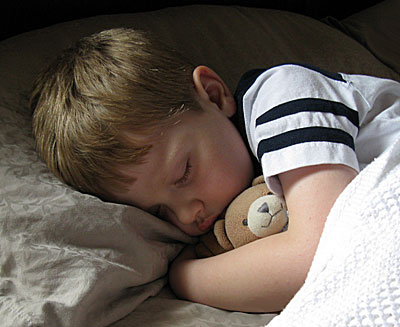Regular Bedtime for Preschoolers Linked to Higher Scores

At the recent annual convention of the Associated Professional Sleep Societies, a new study was presented about the role of sleep in how preschoolers score on various developmental assessments.
The best developmental scores were achieved by 4-year-olds who not only had a regular bedtime but that averaged 11 hours or more of sleep a night. For most of these scores, an earlier bedtime was also a factor.
The study was done by phone survey of the parents of more than 8,000 children. Parents were surveyed when the children were 9 months old and then again when the children were 4 years old. Questions involved usual bedtime and waketime, as well as questions about bedtime routines.
The research found that “scores for receptive and expressive language, phonological awareness, literacy and early math abilities” were all consistently higher with children who’s parents had rules about what time the child needed to go to bed.
From the data of this study, authors are recommending that parents establish a regular bedtime routine with a bedtime prior to 9 pm. Reading to the child or other rituals are helpful in establishing a bedtime routine. Researchers also call for pediatricians to start recommending a regular, early bedtime to parents of their patients.
“Getting parents to set bedtime routines can be an important way to make a significant impact on children’s emergent literacy and language skills,” says Gaylor. “Pediatricians can easily promote regular bedtimes with parents and children, behaviors which in turn lead to healthy sleep.”
This new research builds upon an earlier study published in “Sleep Medicine” in August 2009. That study had revealed that children who went to bed later than 9 pm took longer to fall asleep at night. It also revealed that children without a consistent nighttime routine were likely to get less sleep overall.